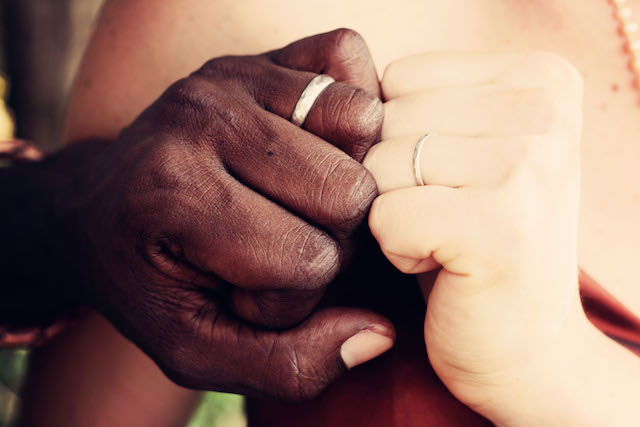
I’m happily married.
However, I never wanted to get married. Ever.
Faced with the choice between a root canal or getting married, I happily would have picked the former.
It is not that I was against finding a life partner. I would have happily shared my life with someone, I just didn’t want to get married to him.
When I was a teenager, people questioned my anti-marriage stance as unromantic.
But can an institution that grew out of the necessity to re-distribute property really be seen as something romantic?
Historically speaking, marriage had little to do with love. Even worse, the idea of equality in marriage is a recent invention.
#Coverture= husbands subsumed women’s legal identities upon marriage. Remnants still in U.S. laws into the 20th century. #WomensHistoryMonth
— DR.TrV (@trvphd) 3. März 2016
For instance, under the English common law concept of “coverture” (which also applied in North America), wives were dependents of their husbands. They had no legal identity of their own—like slaves. The absurd practice of calling a married woman “Mrs. John Smith” is basically an expression of this concept.
Can you imagine anyone calling Harvard Law Professor Bruce Mann, the husband of U.S. politician Elizabeth Warren, “Mr. Elizabeth Warren?” Of course not! Doing so would be demeaning and depersonalizing, and would reduce him to being someone’s spouse, as opposed to his own person. However, doing the same to women used to be common practice.
Why does the English language have different words for married and unmarried women, but not for men?
It does not have to be that way. For instance, in my home country, Germany, all women—regardless of age or marital status—are addressed the same way, as “Frau XY.” In an acknowledgment that the world has changed, the German Ministry of the Interior banned the title“Fräulein” for unmarried women from official use in 1972. Given this, I find it a bit archaic whenever English administrative forms give me the option to be addressed as“Ms.,” “Mrs.” or “Miss.”
Why is it that to this day, many cultures expect wives to take on their husbands’ names? Why do we say that fathers “give away” their daughters? The answers to these questions might lie in the history of marriage.
As a teenager these questions led me to start admiring the relationship between Simone de Beauvoir and Jean-Paul Sartre. These two geniuses were the most important people in each other’s life, yet never got married.
To say that de Beauvoir was critical about marriage would be an understatement. In her masterpiece, The Second Sex, she went as far as writing that “[i]t is said that marriage diminishes a man, which is often true, but almost always it annihilates a woman.”
So unlike my now-husband, who had read less feminist literature in his teenage years than I had, I was adamantly against tying the knot.
I want a relationship like Jean-Paul Sartre and Simone De Beauvoir
— Ilyssa (@ilyssa_forman) 15. Juli 2016
The only reason I begrudgingly accepted that we had to get married were geographical and legal. Nothing that Simone de Beauvoir wrote could take away from the fact that my love and I were living on different sides of a big ocean, and that immigration law is less welcoming of conscientious objectors to marriage than French existentialists.
As someone who is now happily married, I guess I owe my lack of permanent spinsterhood to the U.S. Department of Homeland Security. Consider this my thank you letter to them.
I now realize that an equal, happy and authentic marriage is way better than a root canal.
Admittedly, that is a low bar to meet, so let me rephrase: today, I feel loved and supported by my partner in ways that I did not know were possible before we made this deep commitment to each other. To my surprise, I really enjoy being married.
I am just glad that these days, marriage does not come at the expense of my legal status and I am free to keep my name (or give it to my husband if he wants), as well as open a bank account for myself. This has made it easier for me to arrive at the conclusion that de Beauvoir’s criticism of marriage may no longer be valid in many parts of the world. Similarly, it is worth pointing out that it is questionable whether being in an open relationship with Sartre really made de Beauvoir happier than a marriage would have.
My takeaway from this is that when it comes to marriage, we shouldn’t throw out the baby with the bathwater:
True, there are many things we may dislike about the institution of marriage—its unromantic and unequal history, as well as its traditional limitation to heterosexual love. The good news is that many of us live in countries where the face of marriage itself is changing, and we are free to live our marriage as we see fit. In other words, we are free to create a conscious, equal marriage with a loved one.
Yes, the rituals associated with getting married are mindnumbingly traditional, which begins with the “traditional engagement story” of a man on his knees. However, we don’t need to buy any of it. When it comes to getting engaged, we can be unconventional.
Similarly, the consumerism associated with the wedding ceremony itself can be offputting. However, it is possible—and potentially even advisable—to forego all that. For instance, actor Dax Shephard revealed that his wedding (which he called the “World’s Worst Wedding”) to actress Kristen Bell cost only $142!
If we for a moment leave aside any legal/financial advantages and disadvantages of the institution of marriage, there are a few major things that it can do for us: apart from personal growth, it can create a stronger bond in a relationship, and it can help take that relationship deeper.
And marriage can do that especially if we throw out all the bathwater associated with it.
~
If you would like to improve your relationship, please also check out my complimentary love and romance healing here.
Relephant:
The Science Behind why we Should Ditch Diamond Rings & Costly Weddings.
~
Author: Bere Blissenbach
Image: Désirée Fawn/Unsplash
Editor: Caitlin Oriel











Read 0 comments and reply